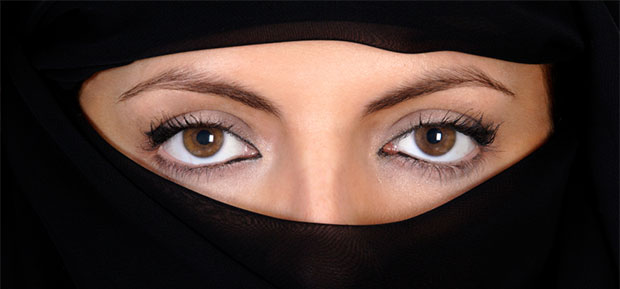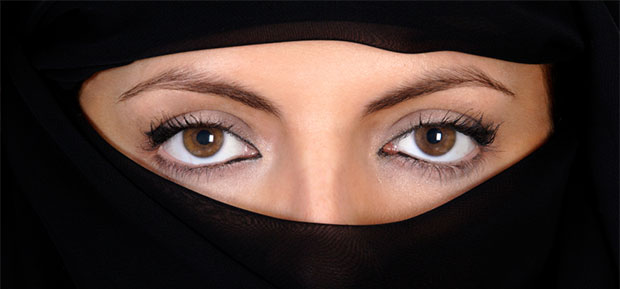
By Nonie Darwish
Recently I spoke at Wellesley College and a large number of female members of the Muslim Student Association attended. As I described the plight of seven Iranian women awaiting death by stoning for sexual violations, I saw no compassion towards their sisters in Islam. I saw only rigid faces and hardened, unsympathetic hearts. Some even made faces at me as I spoke. These young educated Muslim women live in America under the protection of the U.S. Constitution, far removed from the harsh realities of Sharia law I experienced.
I lived in the Middle East under Family Sharia for 30 years and witnessed its cruel and inhumane treatment of women. When I was a teenager, our maid (who was my age) was pregnant as a result of forced rapes by her boss at the home where she previously worked. My mother, who did not want to send her back to her family because of the possibility she would be killed, sent her to a government facility. A year later, we learned the young maid was killed by her father and brother to protect the family honor.
I witnessed female genital mutilation, a common practice that my mother and almost all her generation were forced to endure. I also witnessed polygamy and its devastating effect on family dynamics, husband-wife relationships, women-to-women relationships, and the upbringing of children.
Sharia Islamic Law
Sharia Islamic law is an elaborate legal system created to guarantee there is no defection from the Berlin Wall of the Muslim State. It subscribes to punishments such as stoning, flogging, and amputation of limbs—cruel and unusual by any human standards. Apostasy, which is leaving Islam or converting to another religion, is punishable by death. Sharia was created 100 years after Mohammed to enforce total control over women and the many nations converted by the sword. It codified into permanent law a 7th Century Arabian Peninsula tribal Bedouin culture for every Muslim nation to enforce on its citizens, even in the 21st Century.
In the Islamic State, the woman is most oppressed. Her testimony in court is weighed to equal half that of a man's, and she is entitled to only half the inheritance of a man. A Muslim woman earns respect when she shields her body, face, and even her identity.
Sharia law allows polygamy and wife-beating, and only men can acquire an easy divorce. Although many Muslim men have only one wife, the damage to the husband-wife relationship begins in the Muslim marriage contract. The marriage contract has three spaces to be filled in by the groom with the names and addresses of additional wives should he have any. A Muslim man in the wedding ceremony does not pledge loyalty to his wife, and the wife cannot expect it. A man's loyalty to his wife is optional, and a Muslim woman who has it must thank her lucky stars.
In contrast, the penalty for a woman's extramarital sexual indiscretion is death by stoning or beheading. And rape is a crime under Sharia law, but the criminal and guilty party is always the female, regardless of age and circumstances.
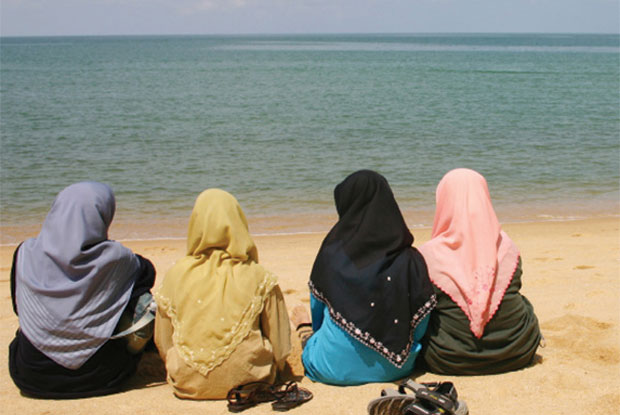
Gender Apartheid
The suffering of Muslim women is not just from the harsh punishments but also from less noticeable abuses. I remember that in Egypt, which is much more moderate than Saudi Arabia, interaction between the sexes was very limited. No dating was allowed, and men and women had very little communication with each other. In Muslim society, a woman interacts almost exclusively with other women and, in most cases, with females within her own family. Gender apartheid is the norm but it ranges in severity from one country to another.
Early Women's Movement in Egypt
There was a feminist movement in Egypt in the 1920s led by the famous Hoda Shaarawi. She stood in the Cairo railroad station and took off her Islamic head cover, or Burka, and started a feminist movement in Egypt that liberated my grandmother, my mother and me. Between the 1920s and 1970s, Egyptian women never wore the Burka.
But that movement ended in the late '70s with the rise of radical Islam. The majority of Egyptian women went back to the veil by choice as a symbol of their acceptance of Sharia as the supreme law. Once again Muslim women regressed to the 7th Century law because they were told this is Allah's law. Islamic garments and Burkas—accommodations to Bedouin desert life that existed prior to Islam—have become a symbol of accepting oppression to glorify Allah.
There is hardly a Muslim feminist movement to speak of today, and the few outspoken feminists remaining in the Muslim world suffer considerable persecution. Egyptian feminist Nawal Al Saadawi fled Egypt after a Muslim radical demanded her hand and leg be amputated. Bahraini feminist Ghada Jamshier is forbidden from writing and speaking in public and has also received death threats. These women have little support from other Muslim women, who remain silent for fear of being labeled an apostate of their faith and a shame to their culture.
Keepers of Their Own Jail
There is a misconception in the West that Muslim women are being forced to submit and can't wait to defeat Sharia law. Unfortunately, that is not true. To the committed Muslim woman trained from birth in Arab culture and Sharia law, Sharia is Allah's law. Standing up against Sharia is equal to standing up against Allah himself.
It is not surprising, then, that a majority of Muslim women end up defending the very laws that keep them in bondage. For a Muslim woman to be left alone or to get ahead, she must become as radical, if not more radical, as a man. Thus you see women telling the media how proud they are of the sons who died as martyrs, and you see the mother of three suicide bombers in Ghaza given a position in the Hamas government. Arab culture is one of pride and shame, and Muslim women are taught to be proud of their religion and to accommodate and accept Sharia. Radical Islam has done a brilliant job in making the prisoners keepers of their own jail.
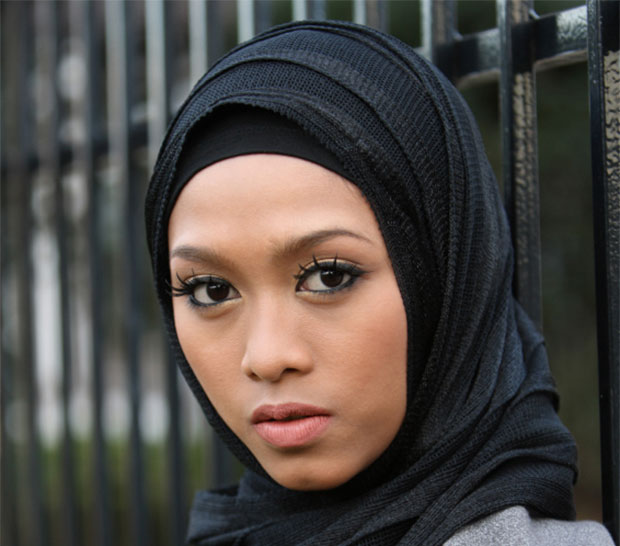
Muslim Women in the U.S.
It is surprising, however, to see young Muslim girls here in America choose to wear the Islamic head cover for the first time in their lives. Some tell me that the ethnic look is a source of power in the West, while others say it is a political statement or that this is their "jihad." When I ask them about polygamy, the stoning of their Islamic sisters in Iran, or the predicament of Muslim women in the Middle East, they are not interested. What they care about most is defending Islam and presenting a good image of Islam and its culture.
I saw much the same reaction from the Muslim students at Wellesley College. After describing several cases across the Middle East of people arrested, jailed, and sentenced to death for apostasy, I asked if any of them were doing anything to oppose such harsh treatment. Not one of the students in the Student Muslim Association was doing anything on behalf of those subjected to such inhumane and barbaric punishments.
Yet these same Muslim groups are very actively telling America that Islam is a religion of peace. They are also very vocal in trying to silence the few Muslim women, like myself, who are speaking against Sharia law's oppression.
Such groups call those who criticize radical Islam "islamophobes." They argue that oppression of women and honor killing have nothing to do with Islam, terrorism has nothing to do with Islam, hate speech has nothing to do with Islam, and 9/11, London, Madrid and Paris have nothing to do with Islam. They insist the West doesn't understand Islam and needs to be educated about the religion of peace.
These young American Muslim women also say they are most respected by Islam. Yet they enjoy many rights and privileges under the U.S. Constitution that Sharia law forbids them: the right to vote; to drive a car; to be outside the home without a male relative escort; to appear in public with their faces, arms, and legs exposed.
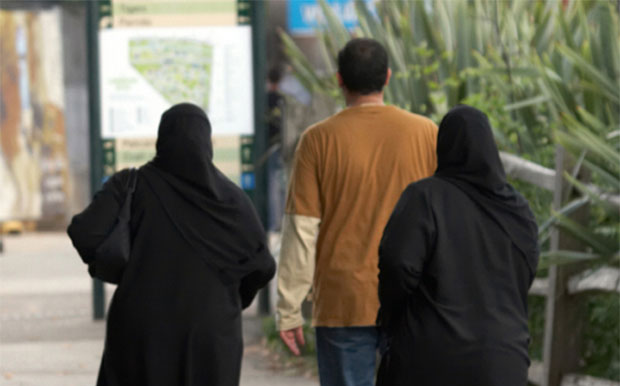
The Threat to Western Nations
America is facing a great danger from Sharia advocates who are trying to convince America that Sharia Islamic law is a religious right compatible with democracy.
But consider Canada's experience. In 1991 Ontario began allowing Catholic and Jewish faith-based tribunals to resolve family disputes—from property and inheritance, to marriage, divorce, and child custody—as a voluntary alternative to over-burdened Canadian courts.
In 2004 Muslims demanded tribunals of their own based on Sharia law. Ontario government officials were poised to allow them until organized protests erupted in major Canadian cities, Paris, London, and Vienna.
Supporters argued it was the only way Muslims could live out their faith. Opponents insisted the principles of multiculturalism were being exploited to enforce oppression. They argued that Sharia's practices undermined Canada's Charter of Rights and Freedom since it inherently discriminated against women.
"It's shocking to see the seeds of an Islamic republic being sown here in Canada," said one woman quoted by The Christian Science Monitor.
But radical seeds exist. On November 6, 2007 Canadian resident Muhammad Parvez murdered his 16-year-old daughter, Aqsa Parvez, in what was widely believed to be a family "honor killing." Aqsa's school friends told media that she had been at odds with her family for some time over wearing the habib and other religious clothing.
"Sixteen-year-old girls worry about makeup and boys, not about surviving," one classmate told The Globe and Mail. "It's not right. She's only 16."
American women can do nothing to help Aqsa Parvez now, and they may not be able to do very much to relieve the oppression of women in the Middle East—that change must come from within.
Yet American women can stand together against the spread of radical Islam and its discrimination against women in the Western world. America must protect its freedom and culture, which will erode if we continue to put political correctness above the values that made this country great.
——-
Author Nonie Darwish, the daughter of a high-ranking Egyptian army officer, was raised in Cairo and Gaza. She is founder of ArabsforIsrael.com and author of Now They Call Me Infidel: Why I Renounced Jihad for America, Israel and the War on Terror, and Cruel and Usual Punishment: The Terrifying Global Implications of Islamic Law.

